
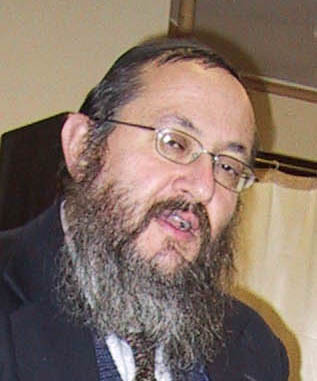


Rabbi Laufer wants my soul. He doesn't explode in my face like an evangelical Southern Baptist: "Brother, do you accept Jesus Christ as your personalsavior?!" And he doesn't whine and nag like a typical Chosid 1 on the street: "Excuse me, but are you Jewish? Did you put on t'filin2 today? It's a mitzvah3 that every Jew should have. I happen to have a pair with me. If you'll come into the van, I'll help you to put them on. You'll have a mitzvah."
Instead, Rabbi Laufer calls me around three in the afternoon. "Dr. Ingall, I need your help today. God needs your help. A man is here and he needs a minyan4for kaddish 5. Minchoh6is at five-thirty, Dr. Ingall. You'll be the tenth. Can you do it?"
"Rabbi Laufer," I plead, "I have to teach at Brown at six o'clock; otherwise, I'd be more than happy to help you."
"I can work with you, Dr. Ingall. Hashem7 can work with you. We can work around your schedule. How about five o'clock, Dr. Ingall. You'll be out in plenty of time."
I'd think up more excuses, but I really don't want to say no to Rabbi Laufer. He's smart. If I say yes, he won't call me again for several weeks. He won't think he's got the hook in my mouth and he has to pull hard. He's subtle, Rabbi Laufer. He's crafty.
Besides, I owe him. When I was the director of the mental health center, and the police would pick up a hallucinating homeless Jew from New York City at the bus station, they would bring him to me. And what was I to do with him? Who would take him? One of the wealthy temples? No way. But Rabbi Laufer opened his heart and his home and his little shtiebel8 to every Jewish soul in need of salvation.
And so, I drive to the rundown two-family house on Hope Street, across from Tortilla Flats, the Mexican restaurant. Here we are in Divine Providence, where most of us live off of Hope. A wooden sign beside the door reads:
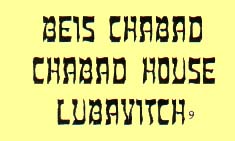
Inside are 7 men, seated at lunch tables arranged in rows, facing east, toward the holy ark and Jerusalem. Three are elderly Russians who speak not a word of English or even Yiddish. But Rabbi Laufer knows his customers and has set out on the tables prayer books in Cyrillic letters.
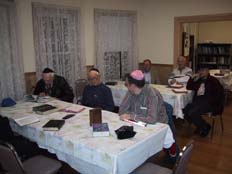
The old men gaze blankly at them, saying not a word.Two are young Lubavitchers in their early twenties, with full black beards, neatly trimmed, black suits, white socks, and black shoes. On their heads are perched the classic Lubavitch black homburgs with oversized brims. One is standing at the back, looking at the ceiling, rocking slightly. At first, I think he's davening 10and shockeling11, but then I realize he is responding to voices that only he can hear. I make eight.
Everything in the room is soiled and musty--the floor, the walls, the chairs, the prayer books, the oilcloth on the lunchtables, the clothes on all the men. A piece of yellow satin covers the holy ark. At its center is a six-pointed Jewish star, which appears to be constructed of two non-equilateral triangles made of yellow duct tape.
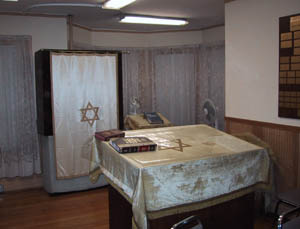
An old Chevy Caprice roars into the driveway, scraping its bottom on the curb. It's the Mitzvahmobile. Out climbs Yoseif, who makes nine, and Rabbi Laufer, who makes ten.
I don't know much about Rabbi Yehoshuah Laufer. He might be 50, but he certainly looks younger. I know he has many, many children. How many--eight,nine? Rabbi Laufer himself won't say. I think it has to do with a kayn ein hora, lest the Evil Eye think there are too many. One is already the Lubavitcher Rebbe of nearby Warwick. A prepubescent daughter of maybe eight is allowed to walk among the men, proudly passing the pushke 12. A five-year son, Shmuel, his round face and deep dark eyes identical to his fathers', stands beside his father and gently shockels in rhythm to the prayers.
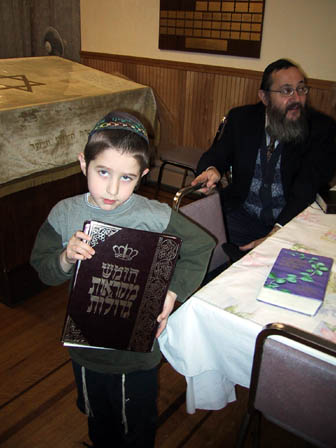
I know another son has had learning problems. When speaking of him, Rabbi Laufer's eyes momentarily lose their sparkle, and a haze of sorrow and pain covers them.
Rabbi Laufer doesn't speak. He shouts. He greets me warmly, announcing to the rest of the minyan that the doctor has made a special tripand has done a special mitzvah. The ceiling starer wanders by, "You're a doctor?" he asks, "What kind of doctor?"
"What kind do you think?"
"A psychiatrist?"
"You know your stuff," I answer.
Rabbi Laufer shouts out the pages. He offers ten-word explanations of what a prayer is about. He shouts in Russian for the men to stand when it is time for kaddish. In between the afternoon and evening prayers, he gives a d'var torah13 in English,Yiddish, and Russian. The ceiling starer asks, "But Rabbi, what if God is watching us, and we do something wrong, but He isn't watching right then, and then we do something good, but He's not watching either, how does He know when he should punish us and when He should be good to us?"
Rabbi Laufer shouts, "That's crazy! You're a crazy person! Sha! Keep quiet! God knows what He's doing and you don't!" It's a variant on the answer God gave Job when he dared to ask about such matters. It may lack a certain (you should excuse the expression) gentility, but the ceiling starer nods in agreement.
Rabbi Laufer is full of good humor, bad jokes, and puns. He knows about what goes on in the world at large, and he knows his Bible and Commentaries. He is nobody's fool, but he can play the fool to seduce you. It works with me.
During the prayers, which are a steady drone of mumbling men, each proceeding at his own pace, I become aware of a constant quiet cough and wheeze behind me. It's Yoseif, who is choking on his own phlegm and saliva. He has lost weight over the past 20 years, and he's down to about 250 pounds. His beard is scraggly and filled with white. His hands shake, and his mouth writhes grotesquely, the side effects of twenty years of first-generation psychotropic medications.
I first met Yoseif when at the mental health center. We owned two small buildings on the wrong side of the tracks. My office was in the building that contained outpatient services. One day, the nurse who ran emergency services next door knocked on my door. "Mike, you better come next door. This one's right up your alley."
As I opened the front door to leave, I heard the unmistakable sound of the shofar14. And there he was, standing on the stairs of the emergency services building, blowing the shofar. He was gargantuan, and with his beard and shirttail hanging out, he looked like Haystack Calhoun from the early days of TV wrestling. His army fatigues and khaki short-brimmed cap, as well his full handsome beard made him resemble Fidel, but Castro never, to my knowledge,wore tzitzis 15 hanging out of his shirt.Nor had he ever been grossly manic.
This was indeed up my alley. I had been born for this moment. "So nu, vos macht a yid?16" I asked.
"Sholom Aleichem!" he bellowed, pumping my hand.
Once he was satisfied that I was Jewishly knowledgable and sufficiently observant, he let his guard down. "So, Dr. Ingall, why do the shvartzer 17 love it when Rosh Hashonah comes around?"
"I don't know, Joe, tell me why," said the straight man.
"It's Yoseif, Dr. Ingall, not Joe. I used to be Joe. Now I'm Yoseif."
"All right, Yoseif."
"Because dat's when dey blows de shofuh!" Peals of laughter followed.
I didn't commit him to the hospital. I knew I could treat him as an outpatient if I could find a safe place for him to live with someone to watch over him. So, I called Rabbi Laufer. "No problem, Doctor. Here, we always can find room."
Yoseif got better. He bought a big truck, painted it blue, and painted on it, in white letters: YOSEIF MOVING COMPANY ,with the slogan over the front grille, YOU'RE SAFE WITH YOSEIF. His two younger brothers, both nearly as large as he, and both afflicted with the same psychiatric illness, worked with him.As long as two out of the three were not manic, they prospered, but in time, their illnesses intensified. After I left the mental health center, I would see Yoseif from time to time at the gym, where he would work out furiously. "My doctor says I'm gonna have a heart attack if I don't getin shape," he would say, pumping on the stairmaster, his tzitzis flapping wildly.
Now, he was a crippled old man. Rabbi Laufer saw me staring at him as we talked. "He's really bad now, Doctor. I have to talk to you about him."I offer to drive Yoseif home.
Rabbi Laufer has saved so many souls. Why does he need mine? And why
do I need to lend it to him?